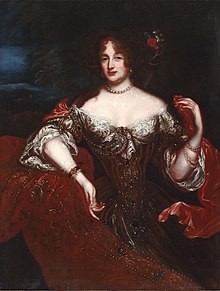Clara Elisabeth von Platen
Clara Elisabeth Countess von Platen (born January 14, 1648 , † January 30, 1700 at Monbrillant Castle in today's Welfengarten in Hanover ) was the mistress of the future Elector Ernst August von Braunschweig-Lüneburg and mastermind in the Königsmarck affair .
Life
Clara Elisabeth was the eldest daughter of Georg Philipp von Meysenbug (1620–1669) and his wife Anna Elisabeth von Meysenbug (1625–1680). Her father tried in vain to accommodate her and her sister Catharina at the French court at Versailles . After their rejection, they moved to the court of Duke Ernst August von Braunschweig-Lüneburg . At the court of Hanover she became lady-in-waiting to Duchess Sophie von der Pfalz .
Around 1672 she became the Duke's mistress and exerted a great influence on her lover. The liaison had a son and a daughter:
- Ernst August (1674–1726)
- Sophie Charlotte (1675-1725)
In September 1673, Clara Elisabeth married the prince tutor Franz Ernst von Platen (1631–1709) in Hildesheim . Her husband made a career very quickly, he became prime minister and made a count. He recognized the two children fathered by Duke Ernst August and his wife during his marriage as his own. At the same time, Clara Elisabeth's younger sister Catharina was the mistress of Prince Elector Georg Ludwig until his marriage (1682) to Princess Sophie Dorothea of Braunschweig-Lüneburg-Celle .
Duke Ernst August gave the Countess the property, which was later converted into an inn, König von Hannover .
Clara Elisabeth knew how to exploit the Duke's endless family quarrels in her favor and was considered the most powerful woman in Hanover. When Philipp Christoph von Königsmarck entered the service of the Elector in 1688 , she was very impressed by the charm of the 17-year-old Count. It is not known whether she entered into a sexual relationship with him. In January 1694 she tried to marry her daughter Sophia Charlotte to the Count, but Königsmarck, who had had a sexual relationship with Sophie Dorothea , the wife of his electoral prince, since March 1692 , refused. Because of this offense by Count Königsmark, Clara Elisabeth revealed to the Prince Elector his wife's infidelity. In the course of this "Königsmarck Affair", Count Königsmarck disappeared without a trace and Sophie Dorothea was imprisoned at Ahlden Castle for the rest of her life .
After Clara Elisabeth's death, copies of a confession that she is said to have made on her deathbed were in circulation. In this she admitted her complicity in Königsmarck's death. However, the original document itself has disappeared.
literature
- Paul Gerhard Zeidler: Elisabeth von Platen, a German pompadour. Novel 1921
- Paul Morand: Sophie Dorothea von Celle. The story of a life and a love. Christian Wegner Verlag 1968, ISBN 3-9800226-0-9
- Thea Leitner: Scandal at court - women's fates at European royal courts. Piper Verlag Munich 1997, ISBN 3-492-22009-6
- Elisabeth E. Kwan / Anna Eunike Röhrig : Forgotten women of the Guelphs. Göttingen: MatrixMedia Verl. 2008, ISBN 978-3-932313-30-1
- Elisabeth E. Kwan / Anna Eunike Röhrig: women from the court of the Guelphs. 20 biographies. Göttingen: MatrixMedia Verl. 2006, ISBN 3-932313-17-8
Web links
Individual evidence
- ^ R. Hartmann : The immediate vicinity of Hanover and Linden , in ders .: History of the royal seat of Hanover from the oldest times to the present . UNICUM, 2013, ISBN 978-3-8457-0308-4 (revised reprint of the original edition from 1880), p. 291ff .; here: p. 292; limited preview in Google Book search
- ^ Thea Leitner : Scandal at Hof , p. 68, Ueberreuter, 1993, ISBN 3-8000-3492-1
| personal data | |
|---|---|
| SURNAME | Platen, Clara Elisabeth from |
| ALTERNATIVE NAMES | Platen, Clara Elisabeth Countess von (full name); Clara Elisabeth von Meysenbug (maiden name) |
| BRIEF DESCRIPTION | Mistress and mastermind in the Königsmarck affair |
| DATE OF BIRTH | January 14, 1648 |
| DATE OF DEATH | January 30, 1700 |
| Place of death | Hanover |
